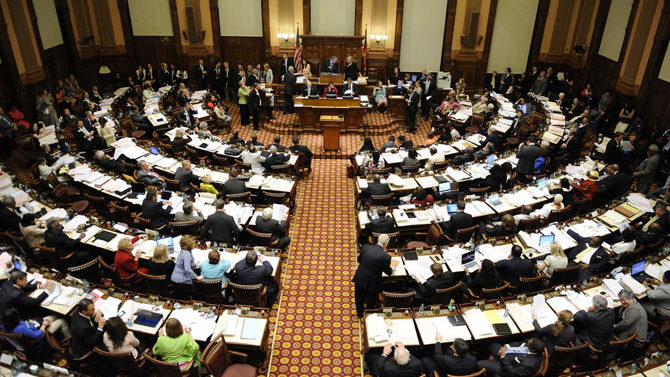Last May, Mayor Nancy Denson flew to New York for the University of Georgia’s Peabody Awards ceremony, the broadcast news equivalent of the Oscars. The University System of Georgia picked up the $1,133 tab for the “awards luncheon, recognition dinner and travel meals for Mayor and guest,” according to state lobbying records.
It wasn’t the first time Denson has traveled on the university dime. (No tax or tuition money is spent on lobbying, but one could argue it diverts other funds away from education.) The University System of Georgia paid $1,648 to bring her to her hometown of Memphis, TN, two years ago to watch the Bulldogs play in the Liberty Bowl. AT&T bought her $375 tickets to a botanical gardens ball in May. And she’s accepted football tickets exceeding $100 in value three times since taking office in January 2011.
It’s legit now, but all those gifts would be illegal under new ethics laws the state legislature will consider this year.
Denson defends accepting the tickets and trips, saying she needs to represent the city and spend time interacting with UGA officials. But she says she can’t afford to pay her own way on her $45,000 salary. “As the mayor of the community, I think it’s very important to attend those kinds of things,” she says. “But when you have part-time people on part-time salaries, it’s hard to ask people to pay for it out of their own pockets.”
They’ll have to start, if lawmakers follow through on their pledge to enact serious ethics reform. State senators are likely to cap now-unlimited gifts from lobbyists at $100. House Speaker David Ralston (R-Blue Ridge) doesn’t think it makes sense to ban a $101 gift when a $99 one is OK. He reversed course from opposing any limits and is now floating a complete ban.
“The House is working on a bill that, as I understand it to be, is a complete ban,” says newly elected Rep. Regina Quick (R-Athens), who campaigned on ethics reform. “How that will come about remains to be seen, because the committee is still working on it.”
Almost everyone’s accepting the free tickets and fancy dinners lobbyists hand out, especially under the Gold Dome. Last year, lobbyists spent $1.4 million buying gifts for government officials, mostly at the state level. UGA Director of Community Relations Pat Allen reported spending $1,438 for Athens-Clarke Commissioner Andy Herod to go to the Outback Bowl in Tampa, FL, in 2011 as the guest of Herod’s wife, UGA Vice President for Public Service and Outreach Jennifer Frum. State Rep. Chuck Williams (R-Watkinsville), former Rep. Doug McKillip (R-Athens) and Sens. Bill Cowsert (R-Athens) and Frank Ginn (R-Danielsville) have all accepted tickets and meals worth more than $100 apiece from university system, Coca-Cola and Georgia Power lobbyists in the past two years. The party in power, in this case the GOP, gets more perks than the minority.
Just because a politician accepts a trip from a lobbyist doesn’t mean she’s crooked—they’re not all vacations or junkets, Denson says. “I feel like if you have people who don’t know what’s ethical internally, you can’t force it on them,” she says.
But state lawmakers are increasingly realizing that voters don’t like even the perception of influence-peddling. Both parties put questions about ethics reform on their July primary ballots; 72 percent of Democrats said they want to end unlimited lobbyist gifts, while 87 percent of Republicans supported a $100 cap.
“We do not want the public to think our votes are being bought and sold,” says Cowsert, who has opposed a cap in the past but now says he and other senators will impose it on themselves.
If so, it will be a stunning turnaround from less than a year ago, when then-freshman Sen. Josh McKoon (R-Columbus) introduced a bill capping lobbyist gifts at $100. Ralston and Senate leaders blocked the bill, saying they’d already dealt with ethics reform after former Speaker Glenn Richardson resigned in the wake of an affair with a lobbyist. Ginn co-sponsored it, but in a Capitol culture where fine dining and sporting events grease the wheels of government, the bill went nowhere.
“When other lobbyists come down the line, [legislators are] looking for Falcons tickets, they’re looking for dinner tickets, they’re looking for pretty much anything they can get their hands on,” says Kelli Persons of the League of Women Voters.
Once legislators got a taste of just how unpopular the current system is, they began to drop their resistance. Over the summer, a group of government watchdog and tea party groups calling themselves the Georgia Alliance for Ethics Reform launched a statewide bus tour drawing attention to the issue. Dozens of candidates, including Quick and Rep. Spencer Frye (D-Athens) signed a pledge to support a gift cap. Polls and election results showed the issue resonated with the public. “That’s given us momentum like we’ve never seen,” says William Perry, executive director of Common Cause Georgia.
McKoon says he plans to introduce new legislation this year that will include the cap, plus restore funding for the Georgia Government Transparency and Campaign Finance Commission—formerly the state ethics commission—which keeps track of lobbyists’ disclosures. The commission’s budget has been cut by 40 percent, it only has 12 auditors to oversee 4,000 elected officials, and the website where people can look up campaign and lobbyist spending reports is often down. McKoon’s bill would also allow the state attorney general to empanel special grand juries to investigate corruption, among other things.
“Until we prove ourselves worthy of the voters’ trust, it’s going to be impossible for us to grapple with the big issues facing our state,” he says.
What are those big issues? They’re the same ones lawmakers have been grappling with for years: inadequate transportation infrastructure, education, health care and resources to deal with the problems. Add to that a national debate over mental health and gun control in the wake of the Sandy Hook shootings, along with a new Republican supermajority that could be tempted to overreach on hot-button issues like abortion.
Georgia Right to Life, for example, plans to push a “personhood amendment” that would declare fertilized eggs to be humans with rights, potentially banning abortion and stem-cell research that’s lucrative both financially and medically. Don Weigel, political director for the Athens-based progressive group Better Georgia, says he’s on guard. “We may all be shocked at how far they’ll push the needle this year,” Weigel says. “There’s really very little stopping them.”
More Budget Cuts

House Speaker David Ralston (R-Blue Ridge) watches as Gov. Nathan Deal delivers his State of the State address last year.
The one thing the legislature is required to do every year is approve a budget to fund roads, schools, prisons and social services. Since the recession hit in 2007, state spending (not counting federal contributions) dropped from $22 billion to $16 billion before rising back to $19 billion this year. While the economy is slowly recovering—and tax collections along with it—Gov. Nathan Deal is still proposing 3 percent cuts in all areas except K-12 education, and maybe even steeper ones in Medicaid, the health insurance program for the poor.
“I must tell you, it’s a rather daunting budget this year,” Deal warned lawmakers last month. “We have some real challenges.”
Not that conservatives are lamenting the recession’s impact on government. Per-capita state spending has declined 17 percent since 2000, and the state employs 6,673 fewer people than it did 12 years ago, Gov. Nathan Deal bragged during a speech at the University of Georgia in December. “So, we are indeed doing more with less, and I think that’s the mantra people want us to follow,” he said.
Deal said he’ll propose a few minor initiatives this year, such as another $50 million to deepen the Port of Savannah, where Caterpillar plans to ship out the tractors and excavators it will manufacture in Athens. Savannah’s port—the fourth-largest and fastest-growing in the nation—is particularly important, as improvements to the Panama Canal in 2014 will allow ships to pass through that are too large to navigate the Savannah River.
“It’s critically important that we don’t let off the gas pedal,” port director Curtis Foltz told lawmakers at UGA’s Biennial Institute for new legislators in December. “We’ve got to get this done as quickly as we can or all the advantages of our ports will go by the wayside.”
Otherwise, little to no new spending is planned. As for raising taxes, forget about it. “All the economists who advise us tell us the worst thing we could do in a recession is raise taxes,” Cowsert says. And in a state that resoundingly rejected a sales tax for transportation last year, anyone who tried would be thrown out of office, he says.
But finding new revenue is exactly what Georgia needs to do if it wants to remain competitive globally, not just with Alabama, according to Alan Essig, executive director of the nonpartisan but left-leaning Georgia Budget and Policy Institute. “We have a revenue problem, not a spending problem, in this state,” he says.
Even keeping the budget from shrinking will be a challenge. The legislature will have to decide whether to renew a 1.5 percent tax on hospitals that’s used to match the federal contribution to Medicaid. The tax barely passed in 2010 and led to a revolt in the Senate, when Cowsert and others stripped Lt. Gov. Casey Cagle of much of his power. (He has since won it back, and Cowsert lost his position in the Senate GOP leadership.) If the tax isn’t continued, Essig warns that many low-income people will be cut from Medicaid rolls, and hospitals that provide a lot of indigent care will be in danger of going under.
Schools Shortchanged
Although Republicans say they’ve shielded K-12 education from the worst of the recent budget cuts and Deal plans to fully restore the 20 days of pre-K he cut in 2011, even without reductions, the state is still far short of paying for its obligations. Essig expects the state education budget to fall $1 billion short of what it should be under the funding formula called Quality Basic Education, or QBE. “You need to raise revenue in some way,” he says. “Obviously, our current politicians aren’t willing to do that. We aren’t making the kinds of investments we need to create economic growth.”
Voters approved a constitutional amendment last year that will make it easier for parents to bypass local school districts and get the state to approve new charter schools—a measure the majority of Clarke County voters opposed. Republican legislators will try to go even further this year, proposing bills to double the $50 million in tax credits parents can take to send their kids to private schools and a “parent trigger” to force school-board votes on charter schools when they present a petition. Local legislators were critical of the tax credit during a recent Federation of Neighborhoods forum. “I have heard of some abuse, and that troubles me,” Cowsert said.
The budget is likely to include small amounts for school buses, special education and nurses, according to Sen. Fran Millar (R-Atlanta), chairman of the Education and Youth Committee. House Education Committee Chairman Brooks Coleman (R-Duluth) is working on a proposal to free high-performing schools from state regulations. And by 2015, districts will have to choose whether to keep their current formula funding or switch to an alternate method with fewer strings and lower state standards. “I heard from local parents and school districts, if this charter amendment is so good, give us the same flexibility,” he says.
On the higher ed front, Deal says he wants to spend $18 million in lottery revenue to raise HOPE scholarships 3 percent this fall, but more tuition and fee hikes are likely to hit college students, and about 140 jobs are on the chopping block at UGA due to budget cuts. University system Chancellor Hank Huckaby said at the Biennial that he’s not going to “whine” about cuts.
“Are we happy about the budget cuts we’ve taken the past four to five years?” Huckaby said. “No, we’re not happy about that… Whatever amount of money you give us, we’re going to do our darndest to spend it wisely.”
Bond packages that in the past have funded construction of new buildings at UGA will be smaller this year, Huckaby said. “We’re not doing an optimal job using the facilities we have,” he said. “Everybody can’t take a class between nine and two o’clock. We can’t afford for our classrooms and laboratories to be basically vacant on Fridays and certainly on Sundays.”
Sandy Hook’s Impact
The recent mass shooting in Newtown, CT, has put gun control front and center in Georgia and nationwide. Sen. Vincent Fort (D-Atlanta) has announced plans for a ban on assault rifles, although it’s highly unlikely to go anywhere in a legislature dominated by Republicans and gun groups like GeorgiaCarry.org, which is to the right of the NRA. In the House, freshman Rep. Charles Gregory (R-Kennesaw) pre-filed legislation to let people with concealed-weapon permits carry guns anywhere, including churches and college campuses. Rep. Paul Battles (R-Cartersville) wants to let school districts arm administrators.
Frye, Athens’ lone Democratic representative, is also the only one who opposes expanding gun rights, questioning why it’s harder to buy allergy medication than a gun or ammunition. The four Republicans who represent Athens say they support the Second Amendment, but they haven’t taken clear stances on specific legislation. “I think there needs to be an awful lot of discussion and analysis before we take action,” Ginn says.
Williams (R-Watkinsville) doesn’t think gun control will help, pointing to violence in media. He recalls bringing six guns to school for a science project in the sixth grade. “If I did that today, it wouldn’t be state news, it’d be national news,” he says.
All five members of the Athens delegation agree that mental health needs to be addressed. Ginn notes that the Los Angeles County and Cook County, IL, jails are the two largest mental health care providers in the country; often, treatment isn’t available until someone commits a crime.
In Georgia, it’s no different. We “quit taking care of people with mental health issues,” Frye says. “We’re under federal mandate to have these programs.” A court order to improve mental health care, though, took the legislature out of the ballgame, Cowsert says. Still, “I think it’s readily apparent the system is not working now,” he says.
Like what you just read? Support Flagpole by making a donation today. Every dollar you give helps fund our ongoing mission to provide Athens with quality, independent journalism.









